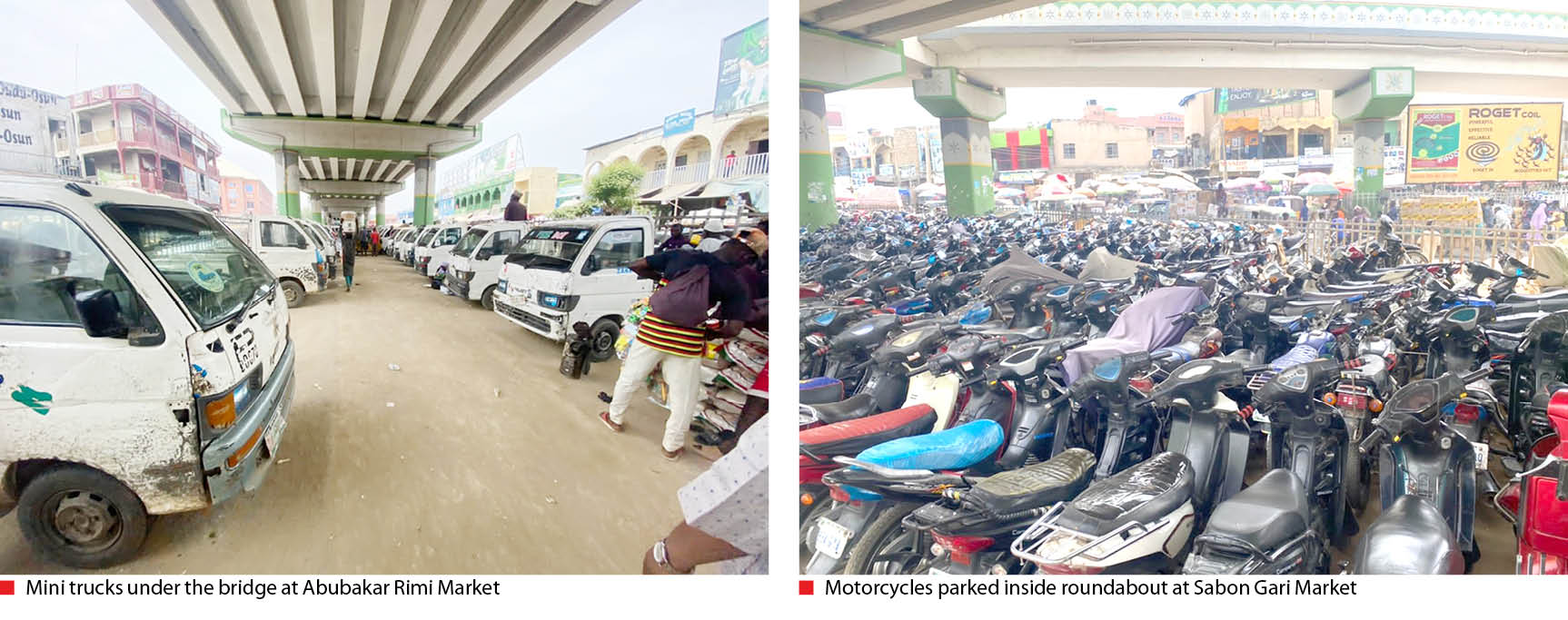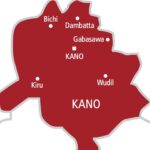Kano is renowned for its several thriving markets, which bring thousands traders into the city on daily basis.
In the last few years, aside from these markets, shopping malls/plazas have also gained popularity, springing up at every corner of the state with many old buildings including the famous Royal Tropicana Hotel giving way to the construction of more malls.
But with this boom in commercial activities, the challenge of parking spaces has remained unresolved while new developments have further compounded the problem.
Kano markets are known to be busy and rowdy regardless of the time of the year.
- Buhari orders pay rise for judicial officers
- ABU at 60: Why it is not yet great and what to do about that
This is because the markets are well-known for both international and local businesses. Within the metropolis, there are seven specialised agricultural food-product markets. The Dawanau market for staple food, tubers and grains; Yanlemo at Naibawa for fruits; Yankaba market for vegetables; Yan Awaki market at Unguwa Uku for the sale of animals; Kara market of Kofar Mazugal for the sale of animals; Yan Goro (Kola nut market) at Mariri; and the Yan Rake at Goron Dutse for sugarcane.
Besides these agricultural food-product markets, Kano city is renowned for Kantin Kwari Textile Market, arguably one of the biggest textile markets in Africa. It also has Kofar Wanbai Market, where a range of commodities like clothing (second hand/Okirika) to foodstuff, meat hanging from hooks, plastics, shoes, bags and many other things are sold, as well as Yankura or Sabon Gari market located in the Sabon Gari area of the state.
Galadima Market is a general market and it consists of traders from different ethnic groups in Nigeria where products like generators, grinding machines, and palm oil, are sold.
Kurmi Market is an excellent place to purchase locally woven materials, local textiles, dyed materials, sculptures, carved stones, silver jewellery, beaded jewellery, jewellery box, leather (cow hides mostly – but genuine leather all the same) shoes, bags, wallets, stuffed animals, local musical instruments (best used for decorations), ostrich feathered shoes, bags and general merchandise.
Farm centre GSM market offers deals on phones, tablets, laptops and accessories. It is the largest GSM market in Kano. Kofar Ruwar has building, construction and scraps; Tarauni market is a modern metropolitan market while Singer market specialises in food items.
Today, with the ever-evolving developmental features coupled with the dynamics of the contemporary 21st century, Kano markets and environs are losing their shapes to a lack of spaces courtesy of the influx of complex buildings in and around.
Daily Trust on Sunday observed that the issue of parking space across Kano markets is now a major challenge to both marketers and people coming in to buy goods and commodities.
While car owners have very limited places to park their vehicles safely, motorcyclists have resorted to using alternate places that are not designated for the purpose to find safety for their vehicles.
Roundabouts, under-bridges, and some sections of the roadside have been turned into parking spaces and parks and the government is using them to generate income for the state notwithstanding.
Speaking to Daily Trust on Sunday, a shop owner at Yankura market, Suleiman Lawal, said while the market serves as where he gets his daily bread, he cannot risk going there with his car. So, he resorted to using a motorcycle.
“Where will I park it and feel at ease that it is safe? Many of us in this market have cars, but we usually leave them for domestic use or other events but not coming to the workplace (market) because of the risk,” he said.
Another shop owner, Tahir Aminu, said “I have two cars, one purposely for me and the other for domestic use but I never come here with a car, I bought a motorcycle just for coming to work.”
On their part, residents who visit markets around the state, have lamented the congestion across the markets and the unavailability of parking spaces.
Yusuf Sani, a father of nine, said he stopped visiting any market in the state with his car since a motorist scratched his one-week-old car while they were trying to navigate their way along a market.
“The level of congestion around commercial areas in the state is worrisome. Whenever I am moving around and it happens that I must pass through the market, I prefer going through longer but safer routes than the shorter congested markets routes,” he said.
On their part, commercial tricycle operators said as lucrative as market areas may look, many of them avoid plying the route because of the lack of space and traffic officers waiting to pounce on those parking in undesignated spaces.
Nasiru Musa and Ibrahim Sa’id, both commercial tricyclists, said no amount of money will make them go through market places, especially in the evening hours.
“If you don’t fight with drivers or riders for a space to park, you will risk being extorted by unruly traffic officials,” Sa’id said.
Daily Trust on Sunday visited the Farm centre GSM market, a newly developing commercial hub in the heart of the metropolis.
With the influx of modern structures put in place, our reporter observed that there is no provision for adequate parking spaces as the market keeps expanding by the day, transforming into a mega multi-billion-naira industry.
The dual-lane roads along the area, many of which have become dilapidated, have been occupied by traders and turned into parking spaces, leaving motorists and commuters to use one lane.
Cars and motorcycles are being parked by the roadsides, sections of the road and even on spaces for pedestrains.
Malam Kato Park, a popular erstwhile destination for those going into ‘Bata’ – a section of the Sabon Gari business area situated between Singer foodstuff market and the Yankura market, is now one of the most congested areas of the state despite the construction of a bridge along the area to ease the congestion.
A visit to the park by our reporter saw most parts of the place turned into a temporary camp for vehicles that convey textiles and other trade goods to states outside Kano.
Mallam Nasiru Sani, a water vendor in his 60s at the park, said he has lived for over 20 years and still goes about his daily activities there.
He associated the downfall of the park with the unwillingness of the government to maintain or transform it into a better place. He further advised the government to take advantage of the space and transform it into a modern parking lot.
Expert weighs in
Architect Khalifa Rabiu Tahir, who is a member of the Nigerian Institute of Architects and a member of the World Economic Forum Global Shapers, said in many metropolitan cities, special parking spaces are created at strategic places like markets to cater to the amount of traffic that moves in and out of such crowded places.
“From car elevators and parking spaces to multi-level car parks as a means of reducing congestion within these crowded places. In other places, only special vehicles, trams, and rickshaws are allowed within such spaces and this provides a source of employment for the locals and ensures ease of transportation within markets and such,” he said.
Tahir added that an urban implosion which is the result of poor urban planning is what is currently plaguing Kano.
“With most people wanting to situate their homes and businesses within the boundaries of the most urbanized parts of Kano e.g. Nassarawa and Tarauni Local Government Areas and the government’s inability to provide and maintain infrastructure within such spaces, overcrowding is inevitable,” he said.
On the way out, Tahir suggested “an expansion and the creation of new metropolis within Kano by the creation of new megacities with access to modern infrastructure, facilities and social amenities. This will lead to the decongestion of the current urbanised parts of Kano as people move there for the purpose of employment, recreation, security and better all-round social services.”
We are in consultation with private investors – Govt
When contacted, the Managing Director of Kano Urban Planning and Development Authority (KNUPDA), Suleiman Abdulwahab, revealed that the state government is in possession of a modern framework to address the matter while in consultation with private investors to key into the project.
He said, “We have, for years, the architectural design of how to cite at least three multi-story parking spaces across the 15 major and recognised markets across the state.
“It is not an issue of marketplaces alone; it is an issue of the state generally. We are currently in consultation with investors that will key into a Public Private Partnership for the realisation of the multi-billion Naira project.”

 Join Daily Trust WhatsApp Community For Quick Access To News and Happenings Around You.
Join Daily Trust WhatsApp Community For Quick Access To News and Happenings Around You.


